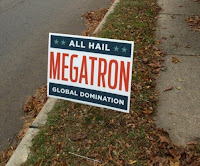Category: Steinbeck
November 3, 2016 / 2 Comments
Democracy In Action!
July 3, 2008
Why Your Friends and Family Suck
Despite every loudmouthed producer or “saying it like it is” celebrity you’ve ever seen on TMZ, one of the hardest things to find in Hollywood is an honest opinion. People are terrified of saying “No.” They’ve almost brainwashed themselves against it. Everyone worries about offending someone and the possible ramifications it could have. You can lose your job in Hollywood for upsetting someone. That same someone could be your boss three years from now. The person asking “Do you like this?” could end up deciding whether or not you get health insurance and a new office next year. So “no” is all but forbidden.
Instead, people dance around answers. They waffle. They make excuses or use doublespeak. In some cases they flat-out lie. Anything to avoid speaking the truth or giving their opinion on something.
And the result is movies like Sahara and X-Men 3.
But that’s material for another rant. Three or four of them, really…
Where am I going with this? Well, you’ll see in a moment or two, if you haven’t already…
Except for a few rare exceptions (those lucky folks who’ve found a long-time partner to work with), writing is something you have to do alone. The odd conundrum here is that one of the very few ways you can improve as a writer is to get feedback. People need to read your work and express their thoughts and opinions about it. You need an audience. And it needs to be a real audience.
What’s a real audience? Well, it’s people who will give you a real opinion. An honest opinion. They’re the ones who won’t mince words or spare your feelings, because they understand you need to know what’s wrong with your work so you can improve it. Being nice, just saying it’s good no matter what, doesn’t help you. It only undermines your attempts to get better.
Another little story…
My mother read a lot of crap writing when I was a little kid. The vast majority of it was mine (reading Stephen King’s Christine was her own decision). She slogged through at least three versions of Lizard Men from the Center of the Earth between third and seventh grade, several pieces of Star Wars fanfic (long before there was such a term), countless short stories, and a truly awful sci-fi “novel” that would put the old 1950’s serials to shame with its clichés. I know for a fact I wouldn’t be where I am today if she hadn’t kept reading and encouraging me to write more.
However, there came a point when I made a realization. My mom was always going to say she liked what I was writing because she was my mom and that’s what good mothers do. It didn’t matter if the material was good, bad, or borderline nonsensical, mom would congratulate me on it.
Which is when I realized I needed to start getting other opinions.
Now, granted, this is an extreme example. I’m not saying my mother should’ve told the twelve-year-old me that my writing was childish and predictable and I didn’t have a chance of ever getting published. That would’ve just been cruel, and also a bit unfair. So in one way, this blind kindness was a good thing.
However, this kindness can also be a trap, and many people, willingly or not, fall into it.
Let’s take Bobo for example (not his real name). Bobo surrounds himself with people who won’t give him honest opinions. He’ll only show his writing to family members or to friends so close they’ve got all the same interests and background. Parents, siblings, friends, lovers—people with a strong desire not to hurt his feelings, and, on some level, a vested interest in keeping him happy.
Surprise, surprise, wha’d’you know—these people all say Bobo’s writing is great. His mom and dad think it’s wonderful. His friends got all the jokes. His brother likes it. His girlfriend (or boyfriend—Bobo is open-minded) even thinks he should send it out to some magazines or agents.
Are they all lying to him? Possibly not. There’s always that chance Bobo is the next John Steinbeck, Ray Bradbury, or Harper Lee, unable to produce anything except pure gold when put in a room with pen and paper. A regular Rumplestiltskin of words, that Bobo.
But, as the men in Vegas say, I wouldn’t put money on it.
Finding a real, honest audience for your work can take years. I came out of college with one friend whose opinion I completely trust and am always desperate to hear. She is tough and merciless, make no mistake, and I absolutely love her for it. In the many years since then (almost–gasp— two decades now), out of the hundreds of people I’ve met, there are maybe five or six more I know I can show work to and get real, useful criticism.
That’s what you’re looking for, after all. Criticism. The real stuff, not the whiny, jealous, ranty stuff of people online or people who never finish their own writing. As the word implies, you want people who can make practical, critical observations about your work. Better yet, people who can make those observations and suggest improvements.
And then, of course– you have to be willing to listen to them. As I mentioned before, honest opinions can be hard to come by. Opinions that come with useful suggestions are almost unheard of.
But the real shame would be if you finally get some and you ignore them.
Now, get back to writing.



